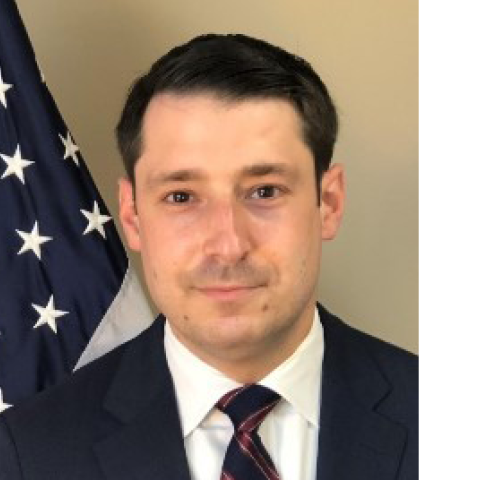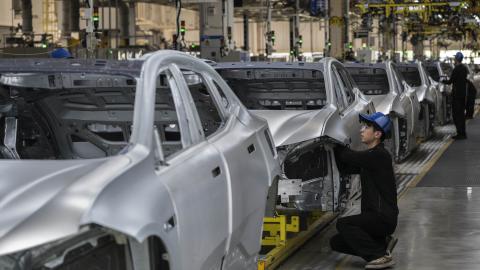As we all await the U.S.-China summit on Thursday, there is an Amy Winehouse test worth applying to Donald Trump’s approach. The test comes from an overlooked Fox News interview last March between Laura Ingraham and Howard Lutnick.
The Fox News host asked the commerce secretary: “Let’s say China comes in and they say, ‘Okay, we’re gonna build stuff in the United States. We want to build automobile companies, our automobiles, in the United States.’ Well, that would kill our car industry. . . . Would you allow that?”
Lutnick didn’t hesitate. “No. That’s what I call an Amy Winehouse—which is no, no, no,” he said with a laugh, alluding to the late songstress’s famous refrain. He continued: “We’ve gotta watch ourselves with the Chinese, because the Chinese are dumpers. What they do is they try to make their industries crush ours, so they can have control of us.”
Lutnick’s answer reflected widespread concerns—in Washington and across U.S. industry—over the national- and economic-security threats posed by China’s galloping advance in the global auto market.
What it didn’t reflect, however, was Donald Trump’s stated views on the subject.
This issue first gained national attention in early 2023, when Virginia Republican governor Glenn Youngkin publicly rejected a proposed battery-plant venture between Ford Motor Company and Chinese battery giant CATL, branding the deal a “Trojan horse” for Beijing.
The Ford-CATL battery plant soon found a home in Michigan, backed by Democrats and some Republicans, yet that did not mute the criticism. In Congress, lawmakers in the House and Senate raised concerns on national-security and forced-labor grounds, demanding a review of the licensing agreement and the blacklisting of CATL from Pentagon contracts for ties to China’s military. Leading the charge was Marco Rubio, then a senator from Florida and now President Trump’s secretary of state.
The controversy over China-linked factories extended beyond CATL. The U.S. subsidiary of Chinese company Gotion High-tech sought to build multibillion-dollar battery plants in Michigan and Illinois, sparking intense local and national opposition. Lawmakers on Capitol Hill pressed to review the Gotion deal, warning that foreign control of lithium-ion battery facilities constitutes critical infrastructure and demands security scrutiny. Voters in Michigan recalled several elected officials who had dared support Gotion’s arrival.
By 2024, the Biden administration codified much of that unease into national policy, using the Commerce Department to restrict Chinese hardware and software from connected vehicles operating in the United States. This effectively banned sales of Chinese cars on national-security grounds. “Cars today aren’t just steel on wheels—they’re computers,” Commerce Secretary Gina Raimondo said. “They have cameras, microphones, GPS tracking, and other technologies that are connected to the internet. Through this rule, the Commerce Department is taking a necessary step to safeguard U.S. national security and protect Americans’ privacy.”
The Commerce Department’s move effectively inaugurated a new type of U.S. technology protection tool: import controls. Building on an authority created in the first Trump administration, the Biden team blocked the import or sale of a wide class of Chinese-origin products in the U.S. consumer market broadly (and not just narrowly in, say, federal procurement). Crucially, this happened before Chinese cars had any significant U.S. market share, so it was minimally disruptive. There was no need for an expensive “rip and replace” of Chinese technology.
Partly for this reason, the Biden move won bipartisan support from Congress—and strong, if quiet, support from U.S. automakers.
But there was one especially prominent voice taking a softer line on China’s possible place in the U.S. auto market: Donald Trump.
While running for office in 2024, Trump repeatedly called for onshoring Chinese auto factories. He slammed the notion of importing Chinese cars from Mexico but welcomed Chinese companies to build in America: “I’ll tell them if they want to build a plant in Michigan, in Ohio, in South Carolina, they can, using American workers, they can.”
Trump’s statements recalled the Reagan-era success of Japanese “transplant” factories, which created jobs and revitalized local economies. But the analogy collapses under scrutiny. Japan in the 1980s was a democratic ally. China in the 2020s is a systemic rival whose companies serve state objectives, and whose technology products can pose both economic and national-security risks if they operate in the United States.
Beijing has played to Trump’s interest. According to reports from Bloomberg and others, Chinese negotiators have quietly pressed Washington to loosen the Committee on Foreign Investment in the United States’ (CFIUS) national-security reviews as part of a broader investment package—potentially worth up to $1 trillion—with auto factories as a potential centerpiece. Of course, auto factories can be valuable employers for Americans. But Chinese car and battery factories would do for Beijing what TikTok already does in cyberspace: embed a hostile actor inside America’s infrastructure.
Beijing’s recent aggressive export restrictions on critical minerals, magnets, and batteries underscore the unwisdom of welcoming Chinese car plants into America. Among the loudest U.S. industry voices now shouting about China’s restrictions—and why Washington needs to offer concessions to Beijing to get it to relent—are U.S. automakers that need Chinese minerals, magnets, and batteries for their vehicles. Inviting Chinese car factories into America would only make more of our domestic industry and labor market vulnerable to Beijing’s inevitable future economic coercion and political interference.
So will a deal for Chinese investment in auto factories emerge from the Trump-Xi summit? We don’t yet know, and there is much else on the agenda, from tariffs and fentanyl to AI export controls and Taiwan.
Trump hasn’t spoken on the auto-plant issue since the campaign, leaving Lutnick’s “no, no, no” as the clearest line of current policy. Advisers like Rubio are almost certain to resist any opening for Beijing-backed plants, as they have before. They would probably support limiting Chinese market access in other key tech sectors, too, such as robotics.
But the decision belongs to Trump. Only his name was on the ballot.



















